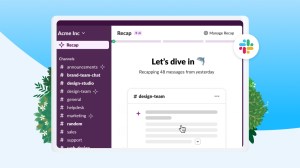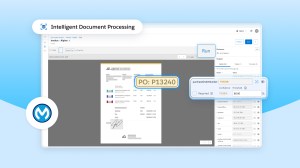Quick take: As employees and employers embrace hybrid work arrangements, legacy methods and tools designed for a time of synchronous collaboration are coming under scrutiny. New survey data and an analysis of additional trusted sources show the benefits of new approaches built around asynchronous collaboration.
Salesforce surveyed nearly 1,300 knowledge workers around the world to understand their expectations and attitudes about the future of work, and what that means for collaboration.
The survey comes as Salesforce celebrates its successful acquisition of Slack, which aims to better empower the work-from-anywhere era.
With leaders today hyper-focused on keeping employees productive, collaborative, and happy as they work from anywhere, the survey’s results also help shed light on how companies can best navigate our collective futures.
Employee engagement is critical in the work-from-anywhere era
According to the survey, just 23% of the knowledge workers say they must always be in the same location as their colleagues to do their best work.
This phenomena is shifting employee expectations, with monumental impacts on employers’ ability to recruit and retain staff. Nearly two-thirds (64%) of knowledge workers say they would consider switching jobs for additional flexibility, and nearly half (49%) say they wouldn’t even consider a job without flexible work hours.
Business leaders have received this message loud and clear: a PwC survey found that 69% of CEOs agree that remote collaboration is here to stay for the long term, and Gartner found that 80% of companies plan to allow employees to work remotely at least part of the time after the pandemic.
Collaboration is central to keeping employees engaged
Recent years have shown a steady rise in understanding that great customer experience is critical to business success. But ultimately, providing a great employee experience is just as critical, given its downstream impacts. A recent study found that 70% of executives believe improved employee experience leads to improved customer experience, yet only 33% believed the inverse to be true.
A natural question, then, is how to keep employees productive and engaged in the work-from-anywhere era. The Salesforce survey suggests a focus on communication and collaboration is a logical place to start.
Case in point: knowledge workers estimate that they spend an average of 59% of their time working with others, and nearly half (48%) say their ability to collaborate with co-workers directly impacts their career growth.
Indeed, 63% of knowledge workers* say the pandemic has permanently changed how they collaborate with colleagues — be it in terms of location, timing, or otherwise. At the core of this shift is technology: 78% of knowledge workers say they are using collaboration technology more often compared to before the pandemic, and 73% say they are using collaboration technology in new ways.
Emails and meetings need a digital-first rethink
Before 2020, collaboration was dominated by familiar tools and tactics like email, deskside chats, and formal meetings. While all of those still have a role in the work-from-anywhere era, their relative value for different scenarios is in question.
Take meetings, for example. While face-to-face interactions are useful in cases requiring real-time, back-and-forth communication, they can be counterproductive when treated as the default method of collaboration. In fact, nearly half (46%) of knowledge workers say they waste significant time in meetings — a sentiment that anyone who’s accepted to an agenda-less calendar appointment can identify with.
But another familiar tool — email — isn’t a cure-all either, particularly given its common and misguided use as an information repository. 38% of knowledge workers say they waste significant time searching for the data or information they need to do their jobs. 25% go as far as to say they’d rather sprint a mile than sift through emails (the same share who would rather do their taxes).
Distractions from the multiple work technologies used on a daily basis — nine on average, according to the survey — can also lead to a lack of focus, productivity, and stress.
The new world of work demands a single destination for asynchronous collaboration
Fostering effective collaboration in the work-from-anywhere era requires a mix of organizational mindset and technology. Research from Slack shows the benefits of combining high-frequency communication with the ability to focus on work which, when compared to a combination of high-frequency communication and an inability to focus, leads to:
- 2.1x better productivity
- 3.4x better satisfaction with work environment
- 3.4x better work-life balance
- 56.0x better stress/anxiety
Consider these findings in addition to the fact that only 40% of knowledge workers say they have a single point of engagement for all work and collaboration, and two major shortcomings in workplace collaboration come into focus:
- The authority to focus on work in lieu of responding immediately to communications
- An interface through which they can both collaborate and access necessary information
Slack has introduced a series of innovations to address these challenges by replicating what workers loved about in-person collaboration while mitigating the challenges of virtual collaboration. But there’s more to come. In partnership with customers, Slack’s integration with Salesforce will build a powerful platform that connects everyone — employees, customers, and partners — with each other and integrates easily with the apps they use every day to get work done.
More information:
Learn more about Salesforce’s acquisition of Slack
Read research on why working from anywhere will become the default
Attend the New Way to Work event on August 17th
Methodology
Salesforce conducted a double-blind online survey of knowledge workers* in the United States, Canada, and the United Kingdom. Data was collected on July 6 and July 7, 2021 and yielded 1,287 responses.
*Knowledge workers’ work is primarily mental labor (i.e, professional services, business management) over manual or task-based labor (i.e, construction, onsite manufacturing, warehouse operations, retail store service/operations, food service/operations).















